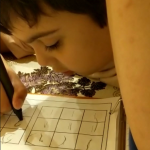Surviving for an Autistic Child at School
When speaking to an autistic child about their experience at school, it’s important to communicate in a clear, kind, and supportive manner, while keeping in mind their unique needs and understanding. Here are some things you can say to help them feel more confident and understood:
1. Reassure Them About the School Environment
- “You are safe here.”
- “We will work together to make school easier for you.”
- “If you feel overwhelmed or need help, you can always ask for it.”
- “It’s okay to take breaks if you need them. You don’t have to do everything at once.”
2. Acknowledge and Validate Their Feelings
- “I understand that sometimes school can feel tough, and that’s okay. Everyone has things that are hard for them.”
- “It’s okay to feel upset or frustrated. Let me know how I can help.”
- “You don’t have to figure everything out by yourself. I’m here to help you when you need it.”
3. Offer Support for Managing Challenges
- “If you’re feeling overwhelmed, remember you can use your special tools, like your headphones or fidget toy, to help calm down.”
- “If something in class is too loud or too bright, we can talk to your teacher about making it better.”
- “If you need a break, it’s okay to ask for one. You don’t have to stay in class if you need a moment to yourself.”
4. Encourage Communication
- “If you need help or something isn’t working for you, you can always tell me or your teacher.”
- “It’s okay to ask questions if you don’t understand something. Teachers are there to help you.”
- “If you’re having trouble talking to someone, you can use your communication tool or even just point to what you need.”
5. Help Them Understand Social Interactions
- “Sometimes people might not understand how you’re feeling, but you can tell them if something is bothering you.”
- “If you want to make friends, you can start by saying hello, or maybe asking if they want to play with you.”
- “Everyone has their own way of communicating. Some people might take time to understand you, but that’s okay. You can be patient with them, and they can be patient with you.”
6. Emphasize Strengths and Positives
- “You have so many amazing talents. You’re really good at [mention something they’re good at], and that makes you special.”
- “You’ve handled tough situations before, and you can do it again. I believe in you.”
- “Even when things are hard, remember that you are doing your best, and that’s enough.”
7. Teach Self-Advocacy
- “It’s okay to say what you need, like if you need help with your work or if you need a break.”
- “You can ask the teacher for help if something is too hard, or if you’re feeling upset, just let them know.”
- “Remember, you’re the expert on what works for you. You can let others know what makes you feel better.”
8. Prepare Them for School Situations
- “Sometimes the classroom can be loud or busy, but you can use your tools to make it more comfortable for you.”
- “If something unexpected happens at school, like a change in schedule, we can talk about how to handle it.”
9. Encourage Positivity and Persistence
- “It’s okay if things don’t go perfectly. Every day is a new chance to try again.”
- “You are learning and growing every day, and that’s really something to be proud of.”
- “Sometimes it’s okay to feel frustrated, but remember that you can keep trying. You’re doing great!”
When talking to an autistic child, it’s crucial to be patient, kind, and clear in your communication. Offering reassurance, validating their feelings, providing practical solutions for challenges, and encouraging them to advocate for their needs can help them feel more empowered and confident about navigating school. Let them know that you’re there to support them and that it’s okay to ask for help when needed.
Autism Treatment Center Videos
Autism treatment with own stem cells
Cord blood association congress
International Quality Crown
Autism Treatment Reviews
Autism treatment with own stem cells
The story of Alessandro (6 years old)
Autism Patient Testimonial - Stem Cell Treatment
Clients Testimonials

Feedback from Yulia, mother of Emily (7 years old) Read More

Feedback by Everita, Katrina’s mother (5 years old) Read More

Feedback from Igor, David’s father (12 years old) Read More

Feedback from Olga, Fedya’s mother Read More

Feedback from Natalia, Radomir’s mother (15 years old) Read More












